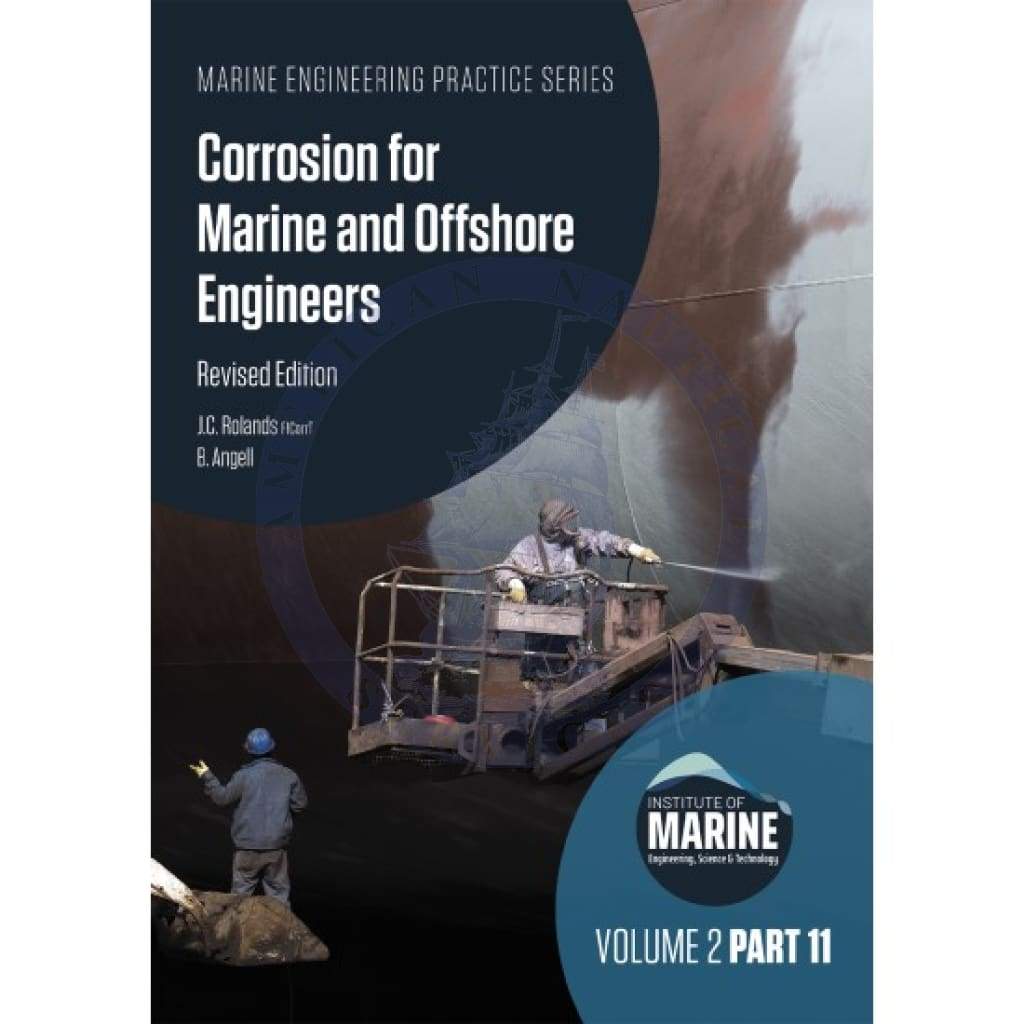Overview
This publication outlines the various types of corrosion and how they affect the metals and alloys used in marine engineering. It discusses methods of corrosion protection and examines how system design can best avoid the potential for corrosion. It also looks at specific environmental corrosion in boilers, gas turbines and fresh water cooling systems.
Onboard corrosion can take various forms, leading to malfunction, downtime and expensive repair.
This publication describes the mechanism of different types of corrosion, including electrochemical and mechanically assisted corrosion. This is followed by a detailed analysis of metals and alloys, including guidance on where they may be found on board, their vulnerability to corrosion and suitable protection systems. The various protection systems and their application are examined, including painting, cathodic protection, chemical treatments and metal coatings.
The book also looks at practical design considerations that can help reduce corrosion, focusing on structural systems, and designs to avoid cavitation erosion and impingement corrosion.
Content
Contents
Acknowledgements
Foreword
1 Introduction to Marine Corrosion
1.1 The corrosion mechanism
1.2 The electrochemical nature of corrosion
1.3 Electrode potentials
1.4 Forms of corrosion
1.4.1 General corrosion and bimetallic corrosion
1.4.2 Selective phase corrosion
1.4.3 Impingement attack
1.4.4 Cavitation erosion
1.4.5 Crevice corrosion
1.4.6 Stress corrosion
1.4.7 Corrosion fatigue
1.4.8 Fretting corrosion
2 Metals and Alloys Used in Marine Engineering
2.1 Ferrous metals
2.1.1 Mild and general engineering wrought steels
2.1.2 Stainless steels
2.1.3 Ferrous metals – cast
2.2 Aluminium base alloys
2.2.1 General considerations
2.2.2 Wrought alloys
2.2.3 Casting alloys
2.3 Copper base alloys
2.3.1 General considerations
2.3.2 Cold working sheet, bar and tube alloys
2.3.3 Hot working plate and forging alloys
2.3.4 Cast alloys
2.4 Nickel base alloys
2.4.1 General considerations
2.4.2 Wrought alloys
2.4.3 Cast alloys
2.5 Joining and hard facing alloys
2.5.1 General considerations
2.5.2 Tin rich and other soft solders
2.5.3 Silver solders and brazing alloys
2.5.4 Hard facing alloys
2.6 Other non-ferrous alloys
2.6.1 General considerations
2.6.2 Lead and lead alloys
2.6.3 Magnesium alloys
2.6.4 Titanium
2.6.5 Zinc and zinc alloys
2.6.6 Bearing metals
3 Corrosion Protection
3.1 Painting
3.1.1 Mechanism of protection
3.1.2 Surface preparation prior to painting
3.1.3 Paint application
3.2 Cathodic protection
3.2.1 General principles
3.2.2 Sacrificial or galvanic anodes
3.2.3 Impressed current installations
3.2.4 Cathodic protection in ships’ spaces and equipment
3.3 Chemical treatments
3.3.1 General considerations
3.3.2 Sodium silicate inhibition
3.3.3 Ferrous sulphate injection
3.3.4 SDD (sodium dimethyldithiocarbamate) injection
3.3.5 Electrolytic metal ion generators
3.4 Metal coatings for corrosion protection
3.4.1 General
3.4.2 Hot dipped coatings
3.4.3 Metal spraying
3.4.4 Electro-plating
3.4.5 Diffusion coatings
3.4.6 Metal cladding
4 Design to Avoid Corrosion
4.1 Structural systems
4.1.1 Design philosophy
4.1.2 Sources of corrosion
4.1.3 Practical design considerations
4.2 Design to avoid cavitation erosion
4.2.1 Mechanism
4.2.2 Sources of cavitation
4.2.3 The influence of corrosion
4.2.4 The detection of cavitation and recognition of its effects
4.2.5 Design criterion to minimise erosion
4.2.6 The erosion resistance of materials
4.3 Design to avoid impingement corrosion
4.3.1 Mechanism of attack
4.3.2 Materials for saltwater pipe systems
4.3.3 Design factors
4.3.4 Protective coatings
4.3.5 Ferrous saltwater pipe systems
5 Specific Environmental Problems
5.1 Boiler corrosion
5.1.1 Fireside corrosion
5.1.2 Waterside corrosion
5.2 Corrosion in marine gas turbines
5.2.1 The corrosion problems
5.2.2 Characteristics of corrosion
5.2.3 Material developments
5.2.4 Remedial action
5.3 Corrosion in freshwater cooling systems
5.3.1 The corrosion problem
References
Details
Title: Corrosion for Marine and Offshore Engineers
Series Details: IMarEST MEP Vol. 2
Number of Pages: 82
Product Code: WS1747K
ISBN: ISBN 13: 978-1-85609-926-4
Published Date: July 2020
Book Height: 239 mm
Book Width: 155 mm
Book Spine: 6 mm
Weight: 0.30 kg







